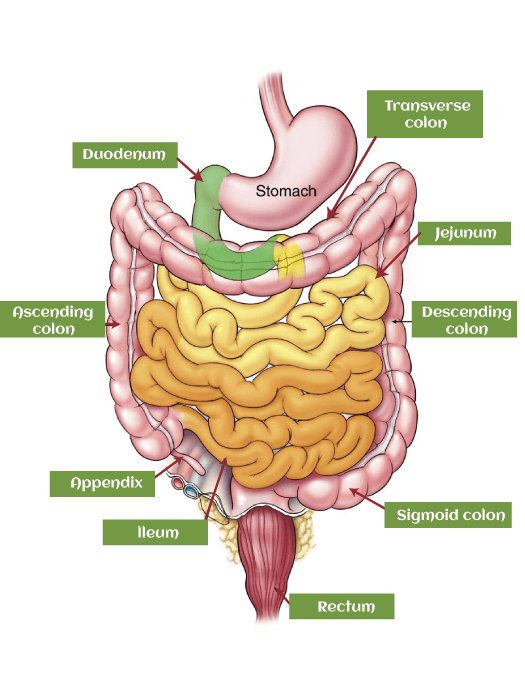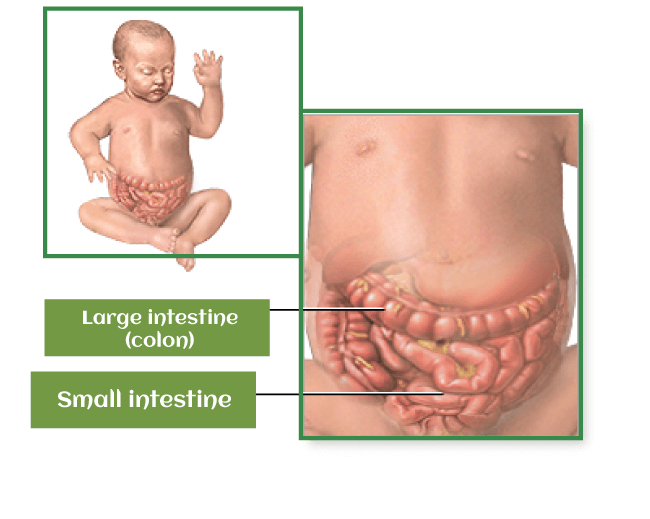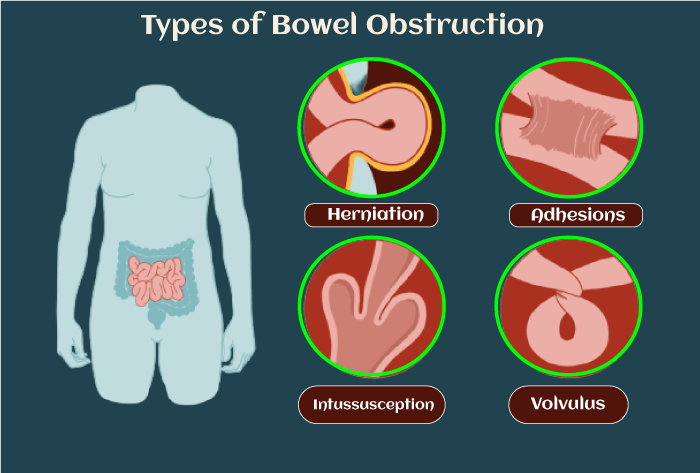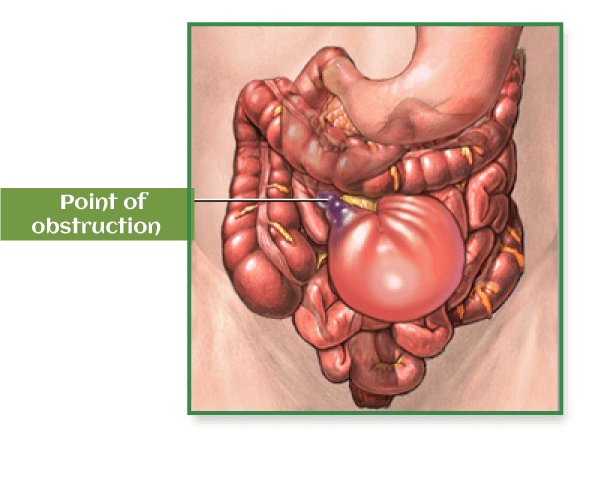Intestinal Obstruction DefinitionIntestinal obstruction is an illness in which an obstacle stops meals, fluids, and gases from flowing normally throughout the intestines. The obstruction may occur in either the large or small intestines and may be triggered by adhesions, tumors, hernias, intestinal twisting, or impacted fecal matter. Pain in the abdomen, abdominal discomfort, feeling sick, throwing up, diarrhea, and difficulty passing gas all indicate intestinal obstruction. Intestinal blockage is a significant medical issue that necessitates immediate medical intervention. 
Why Is Intestinal Obstruction CausedIt could be caused by adhesions, Scar tissue bands that form due to surgery, or abdominal wounds that can bind to the gut walls and produce obstructions.
Different Types of Intestinal ObstructionThere are two kinds of intestinal obstruction: 1. Mechanical ObstructionThis happens if a physical barrier in the intestinal tract stops food and waste from passing through. Adhesions, hernias, tumors, intussusception, volvulus, impacted fecal substances, foreign bodies, criticisms, and congenital anomalies can all create mechanical blockages. 2. Functional ObstructionAlthough there is no visible obstruction, functional obstruction develops when there is difficulty with the skeletal muscle contractions that carry waste and food through the intestines. Nerve or muscle injuries, certain drugs, electrolyte imbalances, and hormonal abnormalities can all induce functional blockages. Ileus, an illness in which the normal functioning of the intestines is delayed or interrupted owing to inflammatory processes, surgery, or other circumstances, is a common type of functional obstruction. Symptoms Of an Intestinal Blockage
It is crucial to remember that the signs of gastrointestinal obstruction can be confused with those of other disorders like diarrhea or irritable bowel syndrome and that not all symptoms will be present in every case. If you feel like you or anyone you know is suffering from an intestinal blockage, seek medical treatment immediately. Diagnosis Of Intestinal ObstructionIntestinal blockage is often diagnosed using a variety of physical examinations, imaging techniques, and laboratory tests. The tests required may differ depending on the presumed reason and degree of the obstruction. The following are some frequent tests to check for intestinal obstruction: Gastrointestinal X-rayThis can assist in discovering bowel obstructions and gas buildup. CT ExaminationThis imaging technique offers additional details of the intestine and may be used to locate and diagnose the source of the obstruction. Ultrasound ImagingThis can detect obstructions or fluid buildup in the intestines. Blood TestsThese may be performed for evidence of illness or electrolyte imbalances. EnemaThese tests require eating or injecting a fluid covering the intestinal tract and making it visible on X-ray. They can assist in determining the precise position and the nature of the blockage. EndoscopyThis procedure includes introducing a flexible, thin tube with an imaging device into the intestines to see and possibly treat the obstruction. Stool ExaminationThis is done to check for blood or infection indications in the stool. In rare circumstances, an intestinal obstruction diagnosis can be made based on the medical history and physical results, particularly when the blockage is complete and severe. On the other hand, imaging studies are frequently needed to verify the diagnosis and establish the right treatment. Treatment Of Intestinal ObstructionLet us have a look at the treatment that can be offered to patients with intestinal obstruction; 1. HospitalizationPatients who have intestinal obstructions are admitted to hospitals. Fluids administered intravenously (in the veins), bowel rest without food (NPO), and occasionally bowel decompression using the nasogastric tube (a pipe that is placed into the nose and travels straight to the stomach) are all components of treatment. 2. Anti-EmeticThey are used to prevent vomiting and nausea; medications might be necessary. 3. SurgerySurgery may be required if the small intestinal tract is strangulated or obstructed. Surgery aims to locate and address the intestinal obstruction's root causes. Sometimes, intestinal portions may require surgery, and it could be necessary to excision and remove the diseased portion. Once the gut is fully clogged or the blood flow is interrupted, surgery is nearly usually required. After surgery, you might require a drainage tube or colon resection. The remaining portion of the bowel is stitched to a hole in the skin after the diseased portion is removed. Stool then exits from the body via the orifice and accumulates in an ostomy bag that is thrown away. The colostrum or ileostomy may only be present temporarily as you heal. The ostomy is healed, and the intestinal ends are reattached after you feel better. If you fail to address the underlying health issue that led to your blockage, like a condition called diver, the blockage can recur. Before weighing additional choices, such as surgical procedures, physicians will frequently examine a patient with complete or partial obstructions. The person should restrict their dietary intake during this time to prevent further building. To keep the patient hydrated, doctors can administer liquids intravenously, directly into the vein. 4. Nasogastric Pipe (NG)This little tube enters the stomach through the nose. Suction is reduced in the stomach by removing gas and trapped fluid. NG reduces pain and nausea. The majority of bowel blockages are minor partial obstructions that resolve on their own. While gases and fluids are removed, the NG tube might aid in the bowel becoming unblocked. Some patients might require more care. Enemas, stents, or any other small mesh tubes are some procedures used to remove the obstruction. Intestinal Blockage ComplicationsTherapy is necessary to prevent problems like dehydration, deficiency of electrolytes, and intestinal perforation, which can result in infections and renal failure. Infection may result if the obstruction prevents blood from reaching a section of the gut.
After getting the stomach flu, the issue affects some kids, and their intestines may get inflamed. The most vulnerable age group for intussusception is children under two years old. This happens when a section of their bowel slips or falls into another part, obstructing their gut. 
Infants cannot express their symptoms, making diagnosing any form of intestinal obstruction difficult. Parents should instead watch their kids closely for any changes or symptoms that might point to a blockage. These symptoms include gastrointestinal swelling, taking the knees up to the chest area, being overly sleepy, suffering a high body temperature, grunting in discomfort, passing blood-looking stools (which are also referred to as current jelly stools), crying out loudly, vomiting, especially yellow-green bile-like vomiting, and showing signs of weakness. You should take your child to the doctor immediately if you detect any of these symptoms or any changes in them. Prevention Of Intestinal Obstruction
ConclusionWhen either the large or small intestine is blocked, food, liquids, and gas cannot move through, which results in intestinal obstruction, a significant medical disease. Numerous things, such as tumors, ruptured intestine adhesions, and impacted stools, can contribute to its development. It may result in intestinal ischemia, electrolyte imbalances, and dehydration if unattended. If you encounter gastrointestinal symptoms, getting medical help right once is critical. Early detection and intervention can lessen problems and enhance results.
Next TopicIrony Definition
|
 For Videos Join Our Youtube Channel: Join Now
For Videos Join Our Youtube Channel: Join Now
Feedback
- Send your Feedback to [email protected]
Help Others, Please Share












